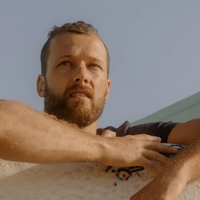At 26, Mark Divine graduated as the No. 1-ranked trainee of his Navy SEAL BUD/S class. He served on active duty for nine years and spent 11 in the reserves. His leadership of teams was so effective that the government tasked him with creating a nationwide mentoring program for SEAL trainees—a program that went on to reduce the BUD/S attrition rate by up to 5 percent.
But Divine isn’t the knuckle-dragging grunt you might expect. He began meditating at age 21 and credits the practice with much of his success in the SEALs. He also stresses the importance of clear communication as a foundation of successful missions. These skills can be learned, and Divine’s speaking techniques have applications that span far wider than the military. Divine has authored several books and founded the Unbeatable Mind Academy, a course designed to blend physical fitness with techniques that improve mental clarity.
The ability to punch through clutter, to say what you mean, is up there with money management or a love of reading on the hierarchy of important skills to acquire in life. It determines your ability to solve conflicts with your partner, persuade your boss to give you a raise, or find common ground with your in-laws at Thanksgiving. As Divine says, “wars are fought” over miscommunications.
During a recent conversation on the Trends w/ Benefits podcast, Divine opened his communication toolkit and offered pragmatic advice on how to get your point across.
Kyle Thiermann: You have a very calm and clear way of speaking. Were there any techniques that helped you develop that skill?
Mark Divine: In the SEALs you’re going out the door on a mission, and if you’re not able to communicate effectively, people could die. So the best SEAL leaders are very clear. They strip out any bullshit words, ideas and concepts that aren’t related. They keep it simple and get to the crux of the matter really quickly. Being in the Special Ops leads to pretty effective communication skills. That said, I still think that I use way too many words. [Laughs.]
Well, the irony is that people who work on their speech are constantly self-criticizing as a means to improve. There’s a blissful naiveté when you're unaware of how you come across.
It’s true, ignorance is bliss.
I’m a big fan of words. I think that effective communication is sort of a spiritual act—it's energy that you’re putting out into the world.
I agree 100 percent. In the SEALs we used to use the acronym PBTA. It means pause, breathe, think, action.
Pause. That stops the reactionary judgment.
Breathe: Breathing through your nostrils, slowing, and deepening the breath will trigger a parasympathetic response. It assures that the reaction you were about to have stays at bay and gives you some space.
Think: Formulate a simple and clear thing to say. By the time this process plays its course you might not need to say anything, and what a blessing that is to the world. [Laughs.]
Action: Finally you can make the decision to either verbalize something or keep your mouth shut.
Quakers and yogis have another version of this. It’s part of an active listening process. You don’t speak until it meets three criteria:
- Is it factually true? You’re not putting out bullshit. It’s not an opinion, which is what most speech is, it’s not a projection, it’s not a reaction.
- Is it useful? Meaning it’s gonna add to the conversation.
- Is it coming from a place of love?
If you can meet those three criteria, go ahead and say it.
Here’s another thing to think through: Take responsibility not just for what you say but how it’s gonna land. If you don’t have sensitivity to the perspective of the individual or group that you’re speaking to, you might intend to say one thing, but it lands completely differently. Wars are fought over that.
Every thought you have affects the world around you, but a verbalized thought is powerful. It's 100 times more powerful than an internalized thought. If you look at this from a spiritual perspective, every thought has karmic energy, so you’re either gonna add to the good karma of the universe, or you’re gonna add to the bad karma of the universe. If we have seven billion people all thinking negative thoughts we’re gonna have a pretty nasty and chaotic world, but if seven billion people are thinking positively, in a connected way, toward peace and an environment that was able to sustain us, that’s what will happen. So words, which follow thoughts, have an incredible impact on everything around us.
When you started meditating, I heard you mention that insights started coming to you about the way that you lived your life. It’s one thing to recognize those insights, but it’s another to turn those into action. There’s often a schism between the insights we have and what we end up doing. Did you develop any method to take action once you had an insight from meditation?
Yes, but I’d like to distinguish between major moves and minor moves. A major move was walking away from a white-collar career to become a Navy SEAL. There was a lot of resistance to this idea. My family, oh my gosh! To them, the military was for losers, for people who couldn’t find their way. So that took a lot of thinking, journaling, and processing. Until one day I became so certain it was my path, that to not do it would have been to risk spiritual death. The type of insight that comes from meditative practice where you literally uncover who it really is that you are, that takes time, journaling, and inquiry. It’s like peeling back an onion until one day there’s no going back.
Then the task list comes out. OK, what’s the first step? Call a recruiter. What’s the second step?
Every morning I go through a process called winning in my mind. I check in with my vision and my purpose. Then I collapse it to the present and I say, “OK, what is my plan for the day?” And I’ll look at my plan and I’ll make sure that it’s going to move me toward that vision. It’s like that saying, “If it’s not a ‘hell yes,’ then it’s a ‘no.’”
I would imagine that young people who follow your work tend to have a lot of ambition. I’ve found that ambition can be a trap because sometimes it doesn’t leave room for flexible outcomes. Can you speak to your relationship with ambition?
The term ambition is usually used in [terms of] outward achievement. But then there’s this inward aspect that we discover through meditation and contemplation. It’s the ambition to grow. Hindu tradition sees life in these four quarters.
- Youth and vigor
- Professional and family life
- Slowing down and being in service
- Turning back toward yourself and toward God
I think it’s natural in the first two quarters to have a lot of ambition. In the first quarter maybe there’s athletic ambition. Then in the second quarter, our ambition begins to become about security, success, and significance. Then in the third quarter, we start to turn inward and reflect more. That’s where some people have a mid-life crisis, because they realize that they were on the wrong path. Then the spiritual path picks up, we see more philanthropy in the third stage. And then the turning in becomes complete and achievement becomes meaningless. The fourth quarter becomes all about how we’re going to leave this world spiritually.




